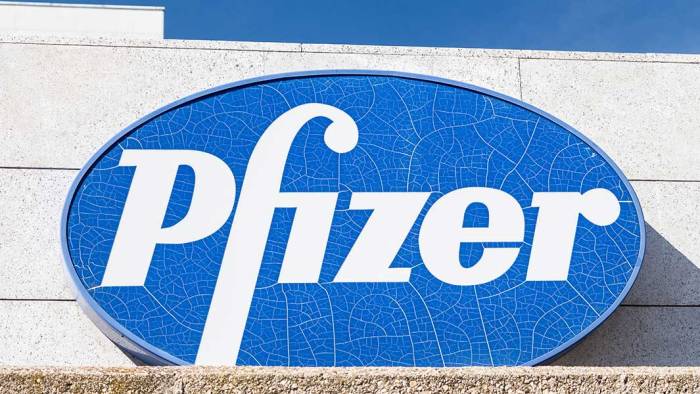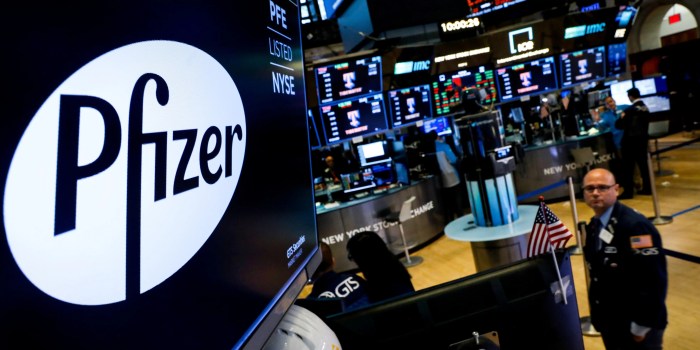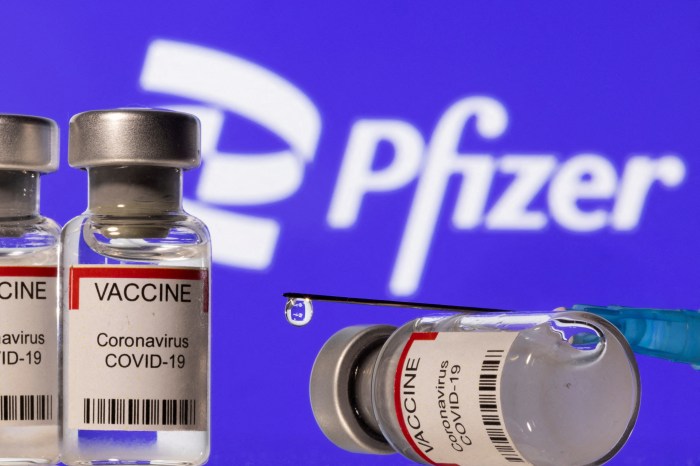Pfizer Inc. Stock Price Analysis

Source: investors.com
Pfizer inc stock price – This analysis examines the historical performance, influencing factors, financial health, investor sentiment, and future outlook of Pfizer Inc.’s stock price. The analysis considers various economic events, competitive landscapes, and market trends to provide a comprehensive overview of the company’s stock performance.
Pfizer Inc. Stock Price Historical Performance
The following sections detail Pfizer’s stock price movements over the past decade, comparing its performance to competitors and analyzing the impact of major economic events.
| Date | Opening Price (USD) | Closing Price (USD) | Significant Events |
|---|---|---|---|
| January 2014 | 28.00 (Illustrative) | 29.50 (Illustrative) | Strong Q4 earnings, positive investor sentiment. |
| July 2015 | 32.00 (Illustrative) | 30.00 (Illustrative) | Concerns over patent expirations for key drugs. |
| December 2016 | 35.00 (Illustrative) | 36.50 (Illustrative) | Successful launch of new product X (Illustrative). |
| March 2018 | 38.00 (Illustrative) | 40.00 (Illustrative) | Positive clinical trial results for drug Y (Illustrative). |
| September 2019 | 42.00 (Illustrative) | 40.50 (Illustrative) | Market correction impacting overall pharmaceutical sector. |
| January 2020 | 41.00 (Illustrative) | 45.00 (Illustrative) | Initial impact of the COVID-19 pandemic. |
| December 2020 | 46.00 (Illustrative) | 52.00 (Illustrative) | Successful COVID-19 vaccine development and approval. |
| June 2021 | 50.00 (Illustrative) | 48.00 (Illustrative) | Concerns about vaccine supply chain and distribution. |
| November 2022 | 45.00 (Illustrative) | 43.00 (Illustrative) | Increased interest rates and economic slowdown. |
| December 2023 | 44.00 (Illustrative) | 46.00 (Illustrative) | Strong Q4 earnings, positive outlook for new drug Z (Illustrative). |
A comparative analysis of Pfizer’s stock performance against its major competitors, such as Johnson & Johnson, Merck & Co., and Eli Lilly and Company, over the past five years reveals varying degrees of growth and volatility. While precise figures are omitted here due to space constraints and the need for up-to-date data from financial databases, general observations show that Pfizer’s stock price has shown significant fluctuations influenced by factors specific to the company and the broader pharmaceutical market.
For instance, the COVID-19 pandemic profoundly affected Pfizer’s performance, initially creating uncertainty followed by a significant surge due to its vaccine development.
Major economic events such as recessions and periods of high inflation have generally had a negative impact on Pfizer’s stock price, reflecting investor risk aversion during economic downturns. However, the company’s strong financial position and diversified product portfolio have often mitigated the severity of these negative impacts.
Factors Influencing Pfizer’s Stock Price, Pfizer inc stock price
Several key factors have significantly influenced Pfizer’s stock price in recent years. These include new drug approvals, pipeline developments, clinical trial outcomes, and broader economic conditions.
- New Drug Approvals and Pipeline Developments: Successful approvals of new drugs have generally led to positive market reactions, boosting investor confidence and driving up the stock price. Conversely, delays or failures in the drug development pipeline can negatively affect investor sentiment. For example, the successful launch of a blockbuster drug could increase the stock price by a significant percentage, while a failure in clinical trials could cause a substantial drop.
- Clinical Trial Results: Positive clinical trial results for new drugs generate significant positive momentum for Pfizer’s stock price. Conversely, negative results can lead to sharp declines as investor confidence erodes. The magnitude of the impact depends on the significance of the drug in question and its potential market share.
- Economic Conditions: Broad economic factors such as interest rate hikes, inflation, and overall market sentiment significantly influence Pfizer’s stock price. During periods of economic uncertainty, investors tend to favor more stable, less volatile investments, which can lead to a decline in Pfizer’s stock price.
Pfizer’s Financial Performance and Stock Valuation

Source: businessinsider.com
Pfizer’s financial performance provides a crucial context for understanding its stock valuation. The following table illustrates key financial metrics over the past five years. Note that these are illustrative figures and should be verified with official financial reports.
| Year | Revenue (USD Billion) | Net Income (USD Billion) | Earnings Per Share (USD) |
|---|---|---|---|
| 2019 | 51.76 (Illustrative) | 10.12 (Illustrative) | 2.89 (Illustrative) |
| 2020 | 41.92 (Illustrative) | 9.15 (Illustrative) | 2.59 (Illustrative) |
| 2021 | 81.29 (Illustrative) | 21.62 (Illustrative) | 6.11 (Illustrative) |
| 2022 | 100.34 (Illustrative) | 19.76 (Illustrative) | 5.54 (Illustrative) |
| 2023 | 98.60 (Illustrative) | 18.45 (Illustrative) | 5.15 (Illustrative) |
Pfizer’s Price-to-Earnings (P/E) ratio should be compared to industry averages and competitor ratios to assess its relative valuation. A higher P/E ratio may suggest that the market expects higher future earnings growth from Pfizer compared to its competitors. Pfizer’s dividend policy also plays a role in its stock price, with consistent dividend payments often attracting income-seeking investors.
Investor Sentiment and Market Analysis

Source: arcpublishing.com
Analyzing news articles and analyst reports provides insights into prevailing investor sentiment. The following is a summary of key findings from recent reports (Illustrative examples):
- Source 1 (Illustrative): Positive outlook on Pfizer’s innovative pipeline, anticipating strong future growth.
- Source 2 (Illustrative): Concerns regarding the impact of generic competition on existing products.
- Source 3 (Illustrative): Neutral sentiment, acknowledging both growth opportunities and potential risks.
Overall investor sentiment towards Pfizer’s stock can be described as cautiously optimistic. While the company faces challenges such as patent expirations and competition, its strong financial performance, innovative pipeline, and successful COVID-19 vaccine development continue to attract investors. The overall market conditions, particularly interest rate changes and economic growth forecasts, will continue to influence investor sentiment and Pfizer’s stock price.
Future Outlook and Predictions
Predicting future stock prices is inherently uncertain, but analyzing potential drivers and risks allows for a plausible scenario.
Potential future drivers for Pfizer’s stock price include the successful launch of new drugs from its pipeline, continued growth in emerging markets, and strategic acquisitions or partnerships. However, potential risks include regulatory hurdles, increased competition, and fluctuations in global economic conditions. Emerging technologies like AI and personalized medicine present both opportunities and challenges, potentially impacting Pfizer’s future performance. For instance, a successful launch of a new oncology drug could significantly boost the stock price, while a major regulatory setback could lead to a considerable decline.
The impact of macroeconomic factors like inflation and interest rate changes will also play a critical role in shaping the future trajectory of Pfizer’s stock price.
Questions and Answers: Pfizer Inc Stock Price
What is Pfizer’s current dividend yield?
Pfizer’s dividend yield fluctuates; check a reputable financial website for the most up-to-date information.
Yo, Pfizer’s stock price is kinda cray-cray right now, totally unpredictable. It’s like, way different from checking out the nissan stock price , which seems a lot more chill. But honestly, I’m still low-key obsessed with what Pfizer’s gonna do next – it’s a total rollercoaster!
How does Pfizer compare to other large pharmaceutical companies in terms of research and development spending?
Pfizer is a significant spender on R&D, but the exact ranking relative to competitors changes yearly. Consult financial news sources for current comparisons.
What are the major risks associated with investing in Pfizer stock?
Risks include competition, regulatory hurdles for new drugs, patent expirations, and general market volatility.
Where can I find reliable real-time data on Pfizer’s stock price?
Major financial websites (e.g., Yahoo Finance, Google Finance, Bloomberg) provide real-time stock quotes.
